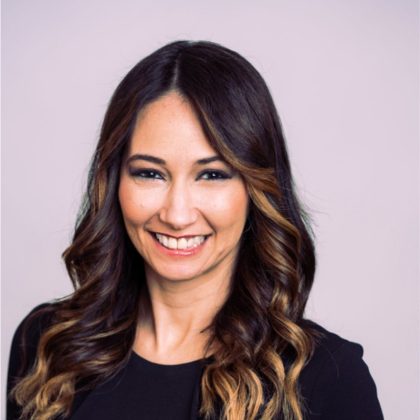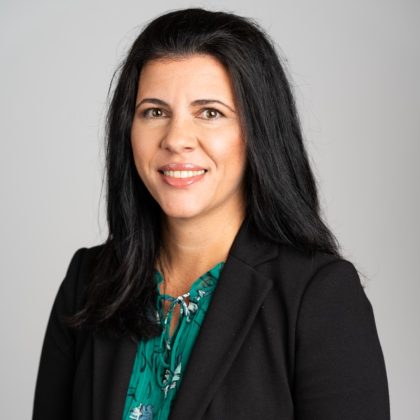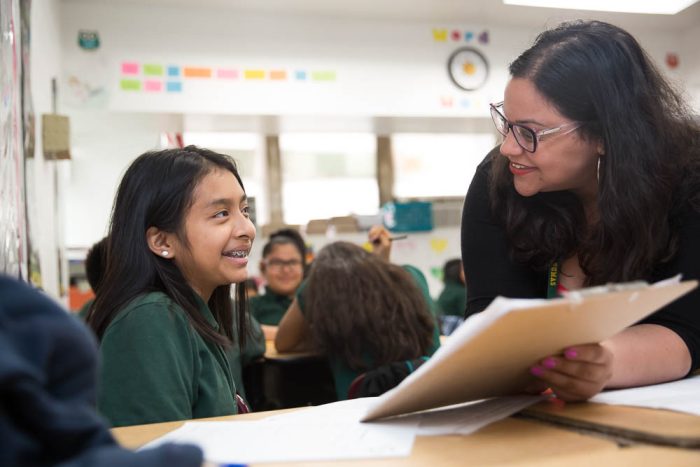In this month’s At the Helm, our Vice President, Executive Search Jesse Bryan spoke with Dr. Toni-Ann Vroom and Dr. Dina Zoleo, Co-CEOs of The Writing Revolution. The Writing Revolution (TWR) aims to enable all students, especially those from historically marginalized communities, to become proficient writers, readers, and critical thinkers. TWR trains and supports educators and school leaders in implementing the Hochman Method, a set of evidence-based and proven strategies for teaching expository writing. Toni-Ann and Dina discuss why there is a writing crisis and how the organization is addressing it, how to be effective co-leaders, and what it takes to build and retain a strong team.
Jesse: You are both founding members of The Writing Revolution. Tell us more about how the organization came to be – and how your paths led you here.

Dr. Dina Zoleo
Dina: It all began with Dr. Judith Hochman; we wouldn’t be here without her. About 30 years ago, Dr. Hochman created a new method to teach writing and instituted it in an independent school for students with language and learning disabilities. She began to give lectures and training sessions at educational organizations, colleges, universities, and public and private schools throughout the United States.
In 2008, Toni-Ann and I were teaching at New Dorp High School in the social studies department. Our school’s academic performance measurements placed it on the brink of closure during that time. We became members of a restructuring team that assessed existing barriers and deficit areas to student progress. We subsequently discovered, not shockingly, that writing was a huge weakness for our students.
So, to address this, Toni-Ann and I attended a workshop with Dr. Hochman. We were immediately in total awe. We listened to Dr. Hochman talk about how she developed a road map for effectively teaching writing. We had never seen anything like it – and it just clicked for us. We thought, “This is it; this is how you teach writing.” We returned to our school and implemented the method immediately in the social studies department. From there, we co-led the effort to implement the method schoolwide – with me as the Assistant Principal and Toni-Ann as the schoolwide Writing Coordinator. Over the next few years, we saw tremendous results. Our students improved substantially in not only writing, but also in reading, critical thinking, and their ability to express themselves.
It was inspiring to see, and we both felt like, “Okay, this is important work, and it needs to be disseminated more widely.” So, in 2014, Toni-Ann and I resigned from the Department of Education and joined Dr. Hochman who had just started the nonprofit, The Writing Revolution.
The Writing Revolution aims to enable all students to become proficient writers, readers, and thinkers. Why is this work so critical? What challenges currently exist?

Dr. Toni-Ann Vroom
Toni-Ann: We always say that writing is the most difficult thing we ever ask students to do. We have heard classroom teachers, college professors, and employers all express that there is a widespread lack of writing skills. Students struggling to express themselves in writing clearly can face more daunting challenges down the line, whether trying to be successful in college or — for those who take an alternate path — gaining access to more promising job opportunities.
And then compounding this crisis is the pandemic and its impact. When our country pivoted to remote schooling, our most vulnerable students felt the greatest impact. So, the situation is undoubtedly graver than ever before.
I should be clear, too, that the issue is not that students can’t learn to write. At TWR, we always make the distinction that assigning writing is entirely different from teaching it. Across the U.S., prospective classroom educators receive little preparation in teaching writing. Teachers need to be equipped with the most suitable instructional methods to unlock students’ potential as writers and learners.
You are addressing these issues by training teachers using the Hochman Method. What makes this method so revolutionary?
Toni-Ann: A standard writing assignment we see often is, “write an essay on x topic.” Students, from a young age, are tasked to write at length, independently – which can be extremely hard. The Hochman Method takes a different approach. It begins with teaching students how to write at the single-sentence level. From sentences, we build to paragraphs, and then from paragraphs to a composition. And since writing at length can be taxing, we teach students how to plan before writing paragraphs and compositions. Another key differentiator is how the Hochman Method embeds writing instruction and practice within all subject areas – writing is not taught as a standalone skill. When students write across the curriculum, it enhances what they learn in every subject area.
It’s funny; our name —The Writing Revolution — means so much more than helping students write better. It’s about changing the way students think and express themselves. And that, in turn, can completely change the trajectory of their lives. The opportunities the method enables are abundant.
You have just welcomed a new Director of Development. How will this position and your philanthropic program prepare the organization for its future?
 Dina: We are so excited to have our new Director of Development, Joie Johnson-Walker, on board.
Dina: We are so excited to have our new Director of Development, Joie Johnson-Walker, on board.
There is an urgent need to train and support teachers nationwide to empower all their students, especially those in underserved communities who may face multiple obstacles, to achieve academic success. Addressing this need means training thousands of educators from all 50 states and abroad. Joie will play a critical role in building out our development department, which will help us advance our mission. She will create a formal fundraising strategy where we can engage philanthropic support to grow our impact, and help teachers make sustainable changes in their schools. Additional support will further strengthen our position to build the operations and infrastructure required to support our current and future initiatives.
Can you share more about how The Writing Revolution has grown in recent years?
Toni-Ann: Before March 2020, most of our teacher training programs were delivered in person, either here in New York City, Washington, D.C., or Louisiana. We had one online course, which we provided once a quarter to a handful of educators. Of course, that had to change drastically with the pandemic. We had to find a way to transition all our classes online and ensure they remained interactive and engaging. Fortunately, we were able to do that successfully. And now, as Dina mentioned, we are training teachers in all 50 states and internationally. We also attribute this growth to Dr. Hochman and Natalie Wexler’s book The Writing Revolution: A Guide to Advancing Thinking Through Writing in All Subjects and Grades, which was first published in 2017, and has gained broad reach to this day. The book sold over 200,000 copies, and more and more districts and teachers are discovering our organization.
Dina: To give you some numbers for perspective, in 2020-2021, we trained about 3,500 teachers. In 2021-2022, we trained 8,000, or 126% more than the previous year. We’re only three months into 2023 and have already passed the 8,000 mark. These numbers mean we’re getting training into the hands of many more teachers and, by extension, many more students.
What does it take to be effective Co-CEOs? What do you enjoy most about your partnership?
Toni-Ann: We recognize that a Co-CEO structure is not the norm, but we have found that the power of having two leaders working together is greater than adding up the individual strengths of both of us. Since we started working together 20 years ago in the classroom, we have had a unique and collaborative relationship. It’s such a benefit to have a thought partner who is aligned with you where it matters the most: the mission and vision of the organization.
Dina: Working together has allowed us to take on this substantial growth. Having someone there to think through issues together and weigh the pros and cons of every decision has really worked for us.
What advice would you share with fellow leaders?
Dina: Culture isn’t created by chance. When you come to The Writing Revolution, you will notice that we have a very diverse team, and at the same time, everyone is on the same page regarding passion for our mission. That’s very important to Toni-Ann and me. With each hire, we aren’t just looking for someone with the qualifications and skills to do the job, but they also need to be dedicated, solution-oriented, committed, and mission-obsessed.
And then, once you have built that strong team, you also must think about retention. Toni-Ann and I both believe that one of the best ways to retain people is to help them understand the impact of this work. Regardless of what role someone plays in our organization, we try to provide them with opportunities to observe the work in action. For example, our Director of Technology just visited one of our partner schools. We wanted him to experience firsthand how schools are implementing the method and how it’s helping teachers and students alike. That way, when he might be dealing with the daily grind of managing our technology, he can reflect and remember there’s a reason why we do what we do. It makes a real difference.
